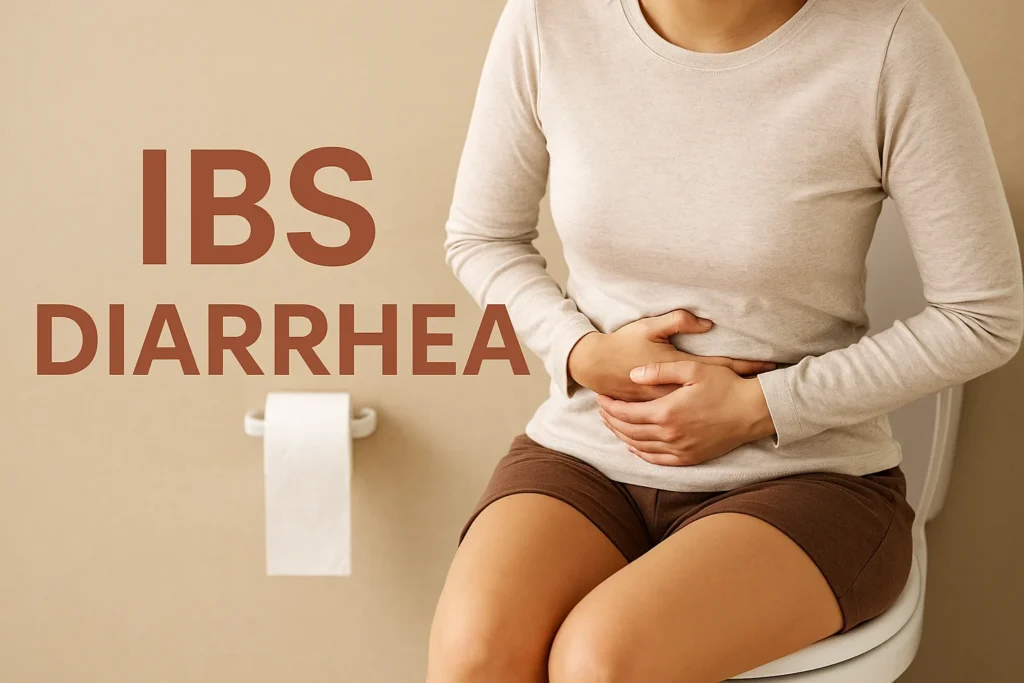
Living with IBS diarrhea can feel like you’re constantly caught off guard. One moment you’re fine, and the next, you’re rushing to the bathroom. For millions worldwide, Irritable Bowel Syndrome with Diarrhea (IBS-D) is more than a digestive issue — it affects daily life, emotional health, work productivity, and relationships.
In this guide, we’ll break down everything you need to know about IBS diarrhea: what it is, why it happens, how to manage it, and how you can live a better life with this chronic but manageable condition.
What is IBS Diarrhea?
IBS diarrhea, or IBS-D, is one of the subtypes of Irritable Bowel Syndrome, a functional gastrointestinal disorder. People with this form of IBS primarily experience frequent loose stools, urgency, and abdominal discomfort. Unlike regular diarrhea caused by infections or food poisoning, IBS-D tends to be chronic, recurring, and unpredictable.
Common Symptoms of IBS-D Include:
- Frequent episodes of loose or watery stools
- Sudden bowel urgency
- Abdominal cramping or pain, especially after meals
- Feeling like you haven’t completely emptied your bowels
- Occasional mucus in stools
- Bloating and gas
These symptoms can vary day to day, and stress, diet, hormones, and gut sensitivity can trigger flare-ups.
What Causes IBS Diarrhea?
The exact cause of IBS diarrhea isn’t fully understood, but research suggests it’s a combination of gut-brain axis dysfunction, intestinal motility problems, and hypersensitive nerves in the digestive tract. Here are some key contributing factors:
1. Gut-Brain Communication Issues
Your gut and brain are deeply connected. In IBS-D, this communication may become unbalanced, causing your intestines to contract too quickly — leading to diarrhea.
2. Altered Gut Microbiome
Studies have found that people with IBS diarrhea often have an imbalance in gut bacteria, which can lead to increased gas production, inflammation, and faster bowel transit time.
3. Food Intolerances and Sensitivities
Foods high in FODMAPs (fermentable sugars), artificial sweeteners, dairy, gluten, and fatty foods can worsen IBS diarrhea symptoms in sensitive individuals.
4. Emotional Triggers
Anxiety, stress, and depression are commonly linked to IBS. The gut is highly responsive to emotional signals, and for many, stress can directly trigger diarrhea.
How is IBS Diarrhea Diagnosed?
IBS is a diagnosis of exclusion, which means other conditions are ruled out first. A gastroenterologist may:
- Review your symptoms and medical history
- Order tests (like stool tests, colonoscopy, or blood work) to rule out infections, celiac disease, or inflammatory bowel disease (IBD)
To be diagnosed with IBS-D, symptoms should be present for at least three months and include recurrent abdominal pain associated with defecation or changes in bowel habits.
IBS Diarrhea vs. Other Conditions
It’s essential to distinguish IBS diarrhea from other digestive disorders like:
- Crohn’s disease
- Ulcerative colitis
- Celiac disease
- Microscopic colitis
- Infectious gastroenteritis
These may share similar symptoms but require different treatments. Never self-diagnose — always consult a healthcare professional.
Best Treatments for IBS Diarrhea
There’s no one-size-fits-all cure, but you can manage IBS diarrhea effectively with a combination of lifestyle changes, dietary adjustments, and targeted treatments.
1. Low FODMAP Diet
This is one of the most effective evidence-based approaches. Eliminating and then slowly reintroducing high-FODMAP foods helps identify personal triggers.
2. Stress Management
Try relaxation techniques like:
- Meditation
- Yoga
- Deep breathing exercises
- Cognitive Behavioral Therapy (CBT)
These practices help calm the gut-brain axis and reduce flare-ups of IBS diarrhea.
3. Anti-diarrheal Medications
Over-the-counter medications like loperamide (Imodium) can provide quick relief during acute episodes but shouldn’t be used daily without guidance.
4. Probiotics
Some strains (like Bifidobacterium infantis or Saccharomyces boulardii) may help balance gut bacteria and reduce symptoms of IBS diarrhea over time.
5. Prescription Medications
For moderate to severe cases, doctors may recommend:
- Rifaximin (a non-absorbed antibiotic for gut bacteria)
- Eluxadoline (to slow down bowel movements)
- Bile acid binders (for those with bile acid malabsorption)
Always discuss the risks and benefits with a healthcare provider.
Natural Remedies and Lifestyle Tips
In addition to medical treatment, simple daily practices can help minimize the frequency and intensity of IBS diarrhea episodes.
Hydration
Frequent diarrhea can lead to dehydration. Sip water throughout the day and consider oral rehydration solutions if needed.
Regular Meals
Eat at consistent times to regulate digestion. Avoid skipping meals or eating large portions.
Avoid Triggers
Track your symptoms in a food and stress journal. This helps pinpoint what foods, situations, or habits worsen your IBS diarrhea.
Gentle Movement
Low-impact activities like walking, cycling, or swimming can ease digestion and reduce stress.
Can IBS Diarrhea Be Cured?
There’s no permanent cure for IBS diarrhea, but that doesn’t mean you have to suffer. With proper management, most people can reduce their symptoms and enjoy a good quality of life. It’s about creating a personalized routine that works for your body — and adjusting when needed.
Emotional Support: The Hidden Struggle
Living with IBS diarrhea often comes with embarrassment, isolation, and anxiety. Flare-ups can feel unpredictable and controlling. You’re not alone — millions silently face the same battle.
Support groups, therapy, and open conversations with loved ones can help you feel understood. Mental wellness is just as important as physical relief when it comes to IBS.
Final Thoughts: Living Well with IBS Diarrhea
IBS diarrhea may be a chronic condition, but it doesn’t have to control your life. Understanding your triggers, managing stress, eating smart, and using both natural and medical therapies can make a world of difference.
You have the power to take charge of your gut health. It may take time, trial and error, and a little patience, but with the right approach, you can reclaim your comfort, confidence, and freedom.
